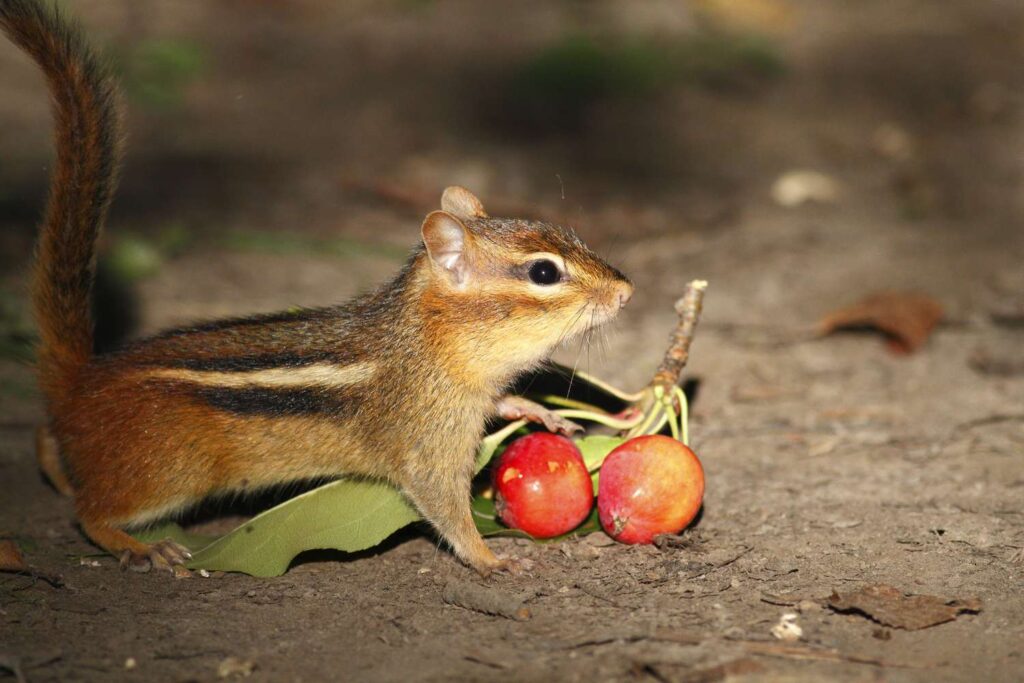How To Stop Chipmunks From Eating Plants

Chipmunks, with their charming appearance and playful demeanor, can quickly become a nuisance when they target your garden plants for a snack. Their voracious appetites and persistent digging can wreak havoc on flower beds and vegetable patches, leaving gardeners frustrated and searching for solutions. In this article, we’ll explore effective strategies for deterring chipmunks from eating your plants, from natural repellents to physical barriers and home remedies.
I. Introduction
A. Understanding the Behavior of Chipmunks
Chipmunks, belonging to the Sciuridae family, are small, ground-dwelling rodents known for their striped fur and bushy tails. They are omnivorous creatures, feeding on a variety of plant materials, seeds, nuts, fruits, and insects. Chipmunks are active during the day and are skilled climbers, burrowers, and jumpers, making them agile and resourceful foragers in garden settings.
B. Impact of Chipmunk Feeding on Plants
While chipmunks may seem harmless, their feeding habits can have detrimental effects on garden plants. They are known to nibble on tender shoots, flower buds, and ripening fruits, causing damage and reducing crop yields. Additionally, their burrowing activities can disrupt root systems and loosen soil, further compromising the health and stability of garden plants.
C. Importance of Implementing Effective Strategies
Given the potential damage caused by chipmunks, it is essential for gardeners to take proactive measures to deter them from feeding on their plants. By implementing effective strategies for chipmunk control, gardeners can protect their plants and preserve the beauty and productivity of their gardens.
II. Natural Repellents
A. Planting Deterrent Plants
One natural approach to deterring chipmunks is to plant species that they find unappealing or repellent. Plants with strong scents, prickly textures, or bitter tastes can discourage chipmunks from foraging in garden beds. Examples of deterrent plants include garlic, onions, marigolds, daffodils, and ornamental Allium varieties.
B. Using Spices and Herbs
Certain spices and herbs can serve as natural repellents for chipmunks due to their strong odors and flavors. Sprinkling cayenne pepper, crushed red pepper flakes, or garlic powder around garden beds can deter chipmunks from approaching plants. Similarly, planting aromatic herbs like mint, lavender, or rosemary can help mask the scent of desirable plants and discourage chipmunk feeding.
C. Creating Barrier Plants
Barrier plants, characterized by their thorny or prickly foliage, can create physical barriers that deter chipmunks from accessing garden beds. Planting prickly bushes or shrubs, such as barberry, holly, or spiny yucca varieties, around vulnerable plants can help prevent chipmunks from reaching them. Additionally, placing rough-textured mulches like pine cones or gravel around plant bases can create uncomfortable footing for chipmunks, discouraging digging and foraging behavior.
III. Physical Barriers
A. Installing Fencing and Netting
One of the most effective ways to prevent chipmunks from accessing garden plants is to install physical barriers such as fences or netting. Constructing wire mesh fences around garden beds or individual plants can create a protective barrier that prevents chipmunks from entering. Similarly, covering plants with bird netting or row covers can provide an extra layer of protection against chipmunk feeding.
B. Implementing Motion-Activated Devices
Motion-activated devices such as sprinklers or ultrasonic repellents can startle chipmunks and deter them from approaching garden areas. Installing motion-activated sprinklers that release bursts of water when chipmunks are detected can effectively discourage feeding behavior. Likewise, ultrasonic repellents emit high-frequency sound waves that are unpleasant for chipmunks, encouraging them to avoid treated areas.
C. Utilizing Visual Deterrents
Visual deterrents, such as reflective objects or predator decoys, can help deter chipmunks by creating the illusion of a threat. Hanging shiny aluminum foil strips or CDs around garden beds can create visual disturbances that deter chipmunks from approaching. Additionally, placing decoy predators like plastic owls or snakes in garden areas can intimidate chipmunks and discourage them from foraging.
IV. Home Remedies
A. Spraying Homemade Repellent Sprays
Homemade repellent sprays made from natural ingredients can effectively deter chipmunks from feeding on garden plants. Mixtures containing ingredients like garlic, vinegar, hot pepper, and dish soap can be sprayed directly onto plants to create a repellent barrier. Reapply the spray after rainfall or as needed to maintain its effectiveness.
B. Using Predatory Pet Deterrents
Pets such as cats or dogs can serve as natural predators to chipmunks and help deter them from garden areas. Allowing pets to roam freely in the yard or garden can create a deterrent effect, as chipmunks are wary of potential predators. Alternatively, placing pet hair or urine-soaked cotton balls around garden beds can create the scent of a predator and deter chipmunks from approaching.
C. Incorporating Noise and Vibrations
Chipmunks are sensitive to noise and vibrations and can be deterred by creating disturbances in garden areas. Installing wind chimes or vibrating stakes around garden beds can create auditory and tactile stimuli that deter chipmunks from foraging. Additionally, placing aluminum cans filled with pebbles or marbles along garden borders can create noise disturbances that discourage chipmunk activity.
V. Additional Tips and Considerations
A. Maintaining Garden Hygiene
Keeping garden beds clean and free of debris can help reduce hiding spots and nesting sites for chipmunks. Regularly remove fallen leaves, brush piles, and other clutter that may attract chipmunks to garden areas. Additionally, keep bird feeders and pet food storage areas clean and secure to prevent chipmunks from accessing additional food sources.
B. Observing Chipmunk Activity Patterns
Monitoring chipmunk activity patterns can provide valuable insights into their behavior and help identify potential entry points or vulnerable areas in the garden. Keep an eye out for signs of chipmunk activity, such as burrow openings, chewed plants, or fecal droppings. By observing chipmunk behavior, gardeners can implement targeted strategies for deterring them from feeding on plants.
C. Seeking Professional Assistance if Necessary
In cases of severe chipmunk infestation or persistent feeding damage, seeking professional assistance may be necessary. Pest control professionals can provide expert advice and assistance in implementing effective chipmunk control measures, such as trapping and relocation or exclusion techniques. Consult with a licensed pest control professional to develop a customized pest management plan tailored to your specific needs and preferences.
Conclusion
In conclusion, deterring chipmunks from eating plants requires a multifaceted approach that combines natural repellents, physical barriers, home remedies, and proactive gardening practices. By understanding chipmunk behavior and implementing effective strategies for chipmunk control, gardeners can protect their plants and maintain the beauty and productivity of their gardens. Experiment with different deterrent methods to find the most effective solution for your garden, and enjoy a chipmunk-free gardening experience year-round.



